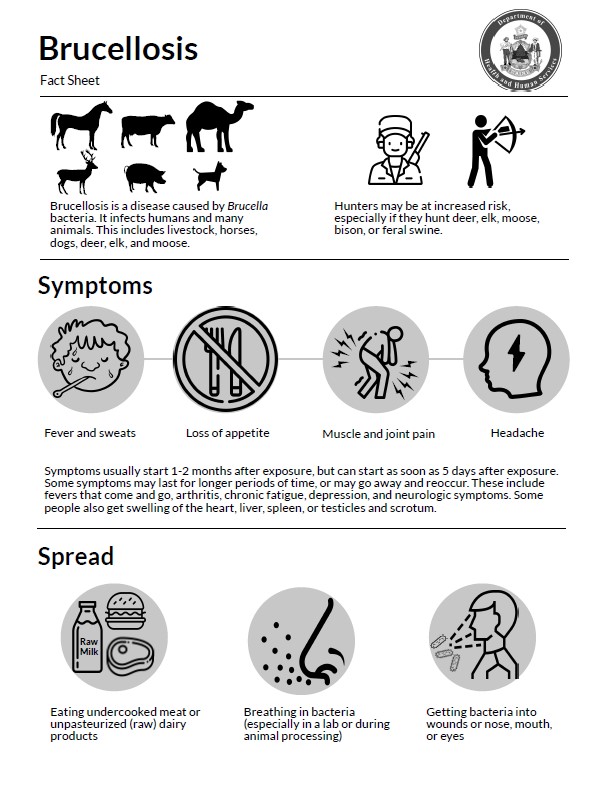DHHS → MeCDC → Disease Surveillance → Epidemiology → Zoonotic → Brucellosis
Brucellosis
On this page:
Photo credit: US CDC
About Brucellosis
Brucellosis is a disease caused by Brucella bacteria. People can get brucellosis from infected animals or contaminated animal products. Both domestic animals (dogs, cats, livestock, etc.) and wild animals can have brucellosis.
Spread
Brucellosis spreads from animals to humans in several ways. These include:

Unpasteurized (raw) dairy products or undercooked meat.

Breathing in the bacteria that cause brucellosis. This is most common in people who work in laboratories or meat-processing.

Getting bacteria into open skin wounds or onto mucous membranes. This includes inside the mouth, nose, or eyes.
People who hunt animals may also be at risk. Common animals include:
- Bison
- Elk
- Caribou
- Moose
- Wild hogs (feral pigs)
Hunters can get the bacteria through all the ways listed above. This includes breathing in the bacteria while dressing game.
Person-to-person spread of brucellosis is rare, but can occur. This includes:
- from an infected mother to infant during breast feeding
- through tissue transplant or blood transfusion
- during sexual activity
Symptoms
Common symptoms of brucellosis include:

Fever and sweats

Loss of appetite

Headache

Pain in muscles, joints, or back

Feeling very tired
Some symptoms can last for long periods of time, never go away, or reoccur over time. These include:

Fevers that reoccur

Arthritis

Chronic fatigue

Depression
Some people may also have swelling of the liver, spleen, heart, or testicle and scrotum. Death from brucellosis is rare.
Diagnosis and Treatment
If you think you might have brucellosis, talk to a health care provider. Your health care provider will test your blood for antibodies to the bacteria. They can also run tests on blood, bone marrow, or other body fluids to look for the bacteria itself.
Once diagnosed, a health care provider can give you antibiotics. Most people recover in a few weeks, though some may take several months to recover completely.
Prevention
 The best way to prevent getting brucellosis is to make sure you do not eat:
The best way to prevent getting brucellosis is to make sure you do not eat:
- Undercooked meat
- Raw dairy products from any animal (cow, sheep, goat, camel, etc.). This includes milk, cheese, and ice cream. Learn more about raw dairy products.
If you are not sure if a dairy product is pasteurized, do not eat or drink it. Pasteurization is when raw milk gets heated to a high temperature for a short period of time. This destroys harmful bacteria that might make people sick, including Brucella bacteria.
 Some people are at increased risk because they work with animals. This includes hunters, animal herdsmen, and people who work in meat processing. People who handle animal tissues should protect themselves by wearing:
Some people are at increased risk because they work with animals. This includes hunters, animal herdsmen, and people who work in meat processing. People who handle animal tissues should protect themselves by wearing:
- Rubber gloves
- Goggles
- Gowns or aprons
This can help keep bacteria from getting into eyes or a cut in the skin.
Icons from www.flaticon.com



